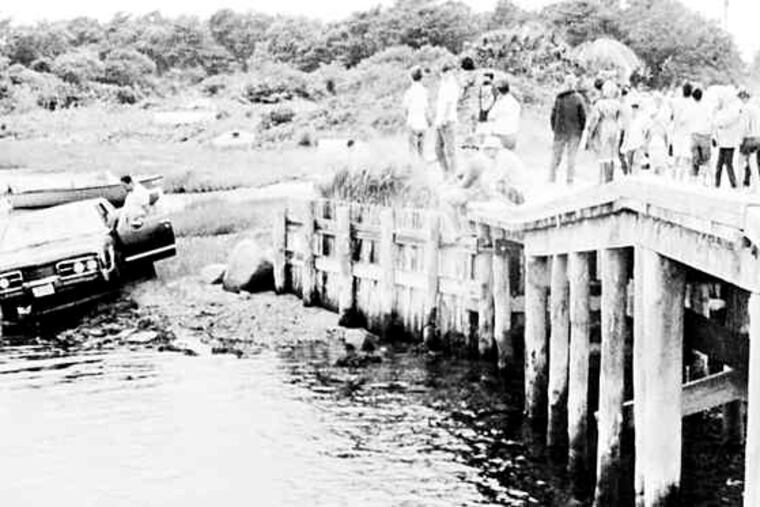
By William C. Kashatus
Last weekend, while Sen. Edward M. Kennedy was being laid to rest, I visited the grave of Mary Jo Kopechne, the 28-year-old woman who was killed when a car driven by Kennedy plunged off a bridge on Chappaquiddick Island. I visited Kopechne's grave to honor her memory and the potential that was lost on that summer evening 40 years ago.
Kopechne is buried at St. Vincent's Cemetery, on Larksville Mountain in Luzerne County, Pa., just a few miles from her hometown, Forty Fort. A modest gray marble stone bears her name and those of her parents. There is nothing to distinguish it as the final resting place of a woman who became the focus of a national scandal - no suggestion that her memory is forever tied to Kennedy and his failed bid for the presidency.
Mary Jo Kopechne was a bright, attractive young woman who appeared to have a promising future in politics. Born on July 26, 1940, she was the only child of insurance salesman Joseph Kopechne and his wife, Gwen. When she was still a child, the family moved to Berkeley Heights, N.J., where Mary Jo attended parochial schools. She had seriously thought about becoming a nun, but, after graduating from Caldwell College, she turned to public service.
Inspired by President John F. Kennedy's challenge to "ask what you can do for your country," Kopechne became part of the civil rights movement, taking a job as a schoolteacher at the Mission of St. Jude in Montgomery, Ala. Three years later, the slender, 5-foot-4 blonde joined the Capitol Hill staff of New York Sen. Robert F. Kennedy.
A devout Catholic, Kopechne lived in a Georgetown neighborhood with three other women. She rarely drank. She served as a secretary to RFK's speechwriters and distinguished herself during his presidential campaign by working long hours at his Washington headquarters.
Along with five other young women collectively known as the "Boiler Room Girls" - after the windowless room they worked in - Kopechne tracked and compiled data on how Democratic delegates from different states might vote. The job involved keeping in contact with field managers and the press.
Kopechne was devastated by Bobby Kennedy's assassination in June 1968, and she felt she could no longer work on Capitol Hill. She took a job with a political consulting firm in Washington, and it was there that she met Ted Kennedy.
On the evening of July 18, 1969, Kopechne attended a party on Chappaquiddick, near Martha's Vineyard, in honor of her and the other Boiler Room Girls. Later that night, she accepted Kennedy's offer to drive her back to her hotel. Kennedy's car swerved off a narrow, unlit bridge and overturned in the water. The senator escaped from the submerged car, but Kopechne died after what Kennedy claimed were "several diving attempts to free her."
By the time Kennedy reported the accident to police the following morning, Kopechne's body had been recovered. The diver who found her reported that she had positioned herself near a backseat wheel well, where an air pocket had formed, and had apparently suffocated rather than drowned. The diver added that he "could have saved her life if the accident had been reported earlier."
Afterward, some in the press unjustly suggested that Kopechne was an opportunist who sought to attach herself to the Kennedys or that she was having an affair with the senator. She should instead be remembered as a young person who was extremely committed to the best ideals of the 1960s: social idealism tempered by political realism, compassion for the underprivileged, and fierce devotion to a just cause. Had she lived, she might well have held political office herself at some point.
It has been difficult for me to mourn the passing of Kennedy, who easily could have been charged with involuntary homicide and sentenced to significant jail time for Kopechne's death. Judge James Boyle instead sentenced him to two months' incarceration, the statutory minimum for the crime, and he suspended the sentence. In announcing his decision, Boyle said Kennedy had "already been, and will continue to be, punished far beyond anything this court can impose."
Kennedy was unable to apologize to the Kopechnes, although he tried to do so on two occasions. But he went on national television to ask the people of Massachusetts for their forgiveness. And they forgave him each time he was reelected to the Senate.
Perhaps Kennedy tried to do his penance there, where he championed historic legislation on civil rights, immigration, education, and health care. If so, Mary Jo Kopechne inspired those achievements, because her death forced Ted Kennedy to strive for a higher standard.